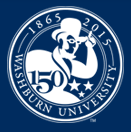Leadership students present projects, internships
May 5, 2015
On May 5 from 1 p.m. to 2:15 p.m. in the Shawnee Room, students from the LE100 leadership course presented their campus action projects. A campus action project (CAP) is a semester-long group project that students who take LE100 are required to complete. The idea behind CAP is for students to identify something on campus that they would like to change and work toward implementing that change. Students are not graded on the outcome of their CAP project, but rather on the process they took to implement that change.
LE100 is the introductory class to the Leadership program and also counts as social science general education. LE100 introduces the foundation of the leadership program as well as the leadership minor and certificate. The leadership certificate involves only taking LE100-LE400 while the leadership certificate involves taking LE100-LE400, the capstone class for the Leadership minor or certificate, as well as taking a lower division level elective and an upper division level elective.
In addition to the five groups that presented their projects, three students from LE400 presented their semester long internships. LE400 is designed for students to take everything they’ve learned from LE100-LE300 and implement in a real world internship.
All of the posters for the CAP presentations and internship presentations were placed on the wall and attendees were encouraged to walk from poster to poster to see the variety of things that had been accomplished over the semester. The posters covered everything from an internship at the Topeka Rescue Mission to a desire to add symbols that signify whether a meal is gluten-free, vegan-friendly or vegetarian to the menu boards in the Union Market.
There were five CAP teams consisting of four people and each person was responsible for presenting a portion of the poster. At the end of the presentation, the listener had the opportunity to ask questions and provide input. People drifted from poster to poster and had the opportunity to hear portions, if not all of, several of the presentations.



